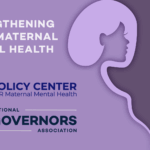
Health
Governors play an essential role in addressing the health needs of the public across all domains. NGA’s Center for Best Practices supports Governors’ offices in addressing emerging public health crises, improving access and quality of care for behavioral health and substance use disorders, and finding ways to innovate healthcare delivery.
To support Governors’ priorities, the NGA Health Team provides information, research synthesis, policy analysis, technical assistance, special projects, and resources to Governors and their staff on a variety of health topics including: public health infrastructure, chronic and infectious diseases, rural health issues, healthcare workforce, cost and coverage issues, behavioral health, health equity, and maternal and child health. NGA also provides special opportunities for states and territories to engage in more in-depth technical assistance such as through policy academies, learning collaboratives, workshops, and roundtables on pressing policy issues. With an emphasis on finding equitable solutions to some of the most demanding health issues, Governors establish partnerships, utilize state and territorial resources, and work across multiple sectors and state/territory agencies to develop and promote relationships to improve the public’s health. In addition to providing timely and individualized Governors’ office-focused technical assistance to Governors, their health advisors, and state and territory agency leadership, our team is working to aid Governors and health leaders in state and territory wide transformation efforts to build and improve the nation’s health through transformation efforts.
Primary State Government Positions Supported
- Governors’ Health Policy Advisors
- Senior State and Territory Health Officials
Services
- Strategic planning facilitation and best practice guidance on health topics or initiatives
- Annual HHS Advisors Institute for state/territory leaders on emerging health issues
- Regular communications and briefings to health policy advisors on health topics
- Customized research briefs and best practice presentations upon request
- Strategic guidance, feedback, and meeting facilitation support to relevant advisors
- Coordinating groups such as the Health Policy Advisors Network, Opioid State Action Network (OSAN), Medicaid Advisors Network, etc…
NGA Health Networks
- Health Equity Learning Network – In 2023, the NGA Center convened states and territories to discuss approaches and communication strategies regarding health equity. With support from the Robert Wood Johnson Foundation (RWJF), the NGA Center for Best Practices launched the “NGA Health Equity Learning Network.” The learning network is an opportunity for Governors’ offices and their health leaders to address health equity priorities. The learning network will focus on state and territory best practices related to health equity policy across several populations, including people with disabilities, racially and ethnically marginalized groups, and rural communities.
- Health Policy Advisors Network – The Health Policy Advisors Network convenes Governor’s advisors on critical challenges in health impacting their states or territories. Through monthly calls that foster collaboration, the network is able to be a platform for sharing insights, strategies, and best practices for an evolving health landscape.
- Medicaid Advisors Network – The Medicaid Advisors Network brings together Governors’ Medicaid advisors and Medicaid state agency policy analysts to discuss key regulations and analyze the impacts on states and territories through a series of capacity building tools such as monthly roundtables, technical assistance and resource sharing. Members of the network focus on sustainable funding solutions, improving quality of care for Medicaid beneficiaries, and closing gaps in access to care.
- Opioid State Action Network – The Opioid State Action Network is comprised of Governor’s office staff (including policy advisors for criminal justice and health) and state officials from departments of public safety, corrections, health, behavioral health, Medicaid, and other related agencies. This network convenes to discuss critical new developments in opioid litigation and state policy.
Focus Areas
- Adverse Childhood Experiences and Trauma
- Behavioral Health (Substance Use and Mental Health)
- Cost and Coverage
- Disease Prevention and Management
- Health Equity
- Health Workforce
- Maternal and Child Health
- Medicaid
- Population Health
- Public Health Infrastructure
- Social Drivers of Health
- Substance Use and Substance Use Disorder
Meet the Team
- Brittney Roy-Morales, Program Director
- Alex Entner, Policy Analyst
- Anna Heard, Senior Policy Analyst
- Asia Riviere, Senior Policy Analyst
- Grace Burns, Policy Coordinator
Featured Projects and Initiatives
Improving Maternal and Child Health in Rural America
With generous support from the Health Resources and Services Administration, Merck for Mothers, Pritzker Family Foundation, and March of Dimes, The National Governors Association Center for Best Practices launched a Learning Collaborative in March 2024 to support nine Governors’ offices as they work to improve maternal and child health (MCH) outcomes. The Collaborative supports the growth and development of state and territory-level, rural MCH initiatives. States currently participate in the Collaborative include: Alabama, American Samoa, Illinois, Michigan, Missouri, Nevada, Pennsylvania, Virginia, and Washington. Learn more…
NextGen Healthcare Workforce Project Year 3
NGA launched the Next Generation of the Healthcare Workforce project in 2022 with support from HRSA. The project supports Governors’ offices and other senior state officials in implementing strategies to strengthen and grow the next generation of the healthcare workforce. Year three of this project will focus on a policy academy and learning network to lay the foundation for new initiatives, funding opportunities, or administrative policies for improving healthcare workforce. Learn more…
Health Equity Learning Network
In 2023, the NGA Center convened states to discuss approaches and communication strategies regarding health equity. In 2024, the NGA Center will facilitate a learning network of states and territories interested in advancing their health equity goals. Learn more…
Towards Epidemic Preparedness
Through the “Towards Epidemic Preparedness: Enhancing Public Health Infrastructure and Incorporating Data-Driven Tools project, the National Governors Association Center for Best Practices (NGA Center) seeks to build on its strong history of working across sectors in a bipartisan fashion to support the needs of the U.S. Governors and their trusted advisors in 55 states and territories. Specifically, the NGA Center is supporting Governors and other senior state officials by providing technical assistance, and engaging Governors’ advisors to identify best practices for implementing forecasting models to predict infectious disease outbreaks and empower response. This project is in collaboration with the Center for Outbreak Response Innovation (CORI) at Johns Hopkins Center for Health Security
NGA Health Library

Governors’ Health Priorities in 2025

2025 Health and Human Services Policy Advisors Institute

Strengthening Rural Maternal Mental Health

Leveraging the Rural Health Transformation Program to Improve Behavioral Health Outcomes

Rural Health: A Strategic Opportunity for Governors

